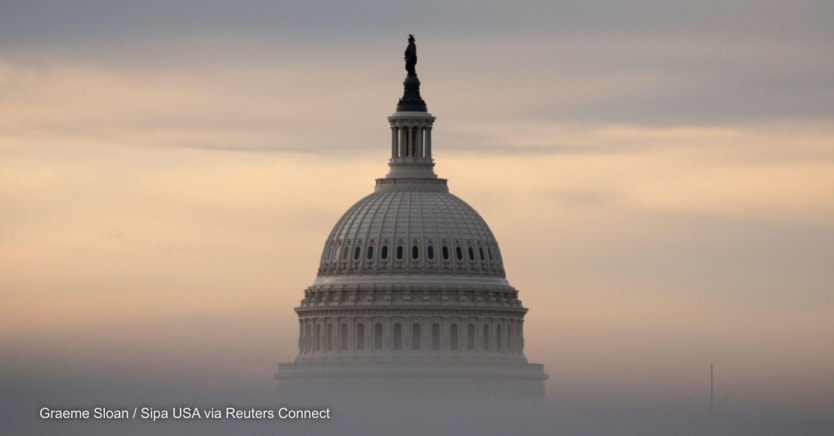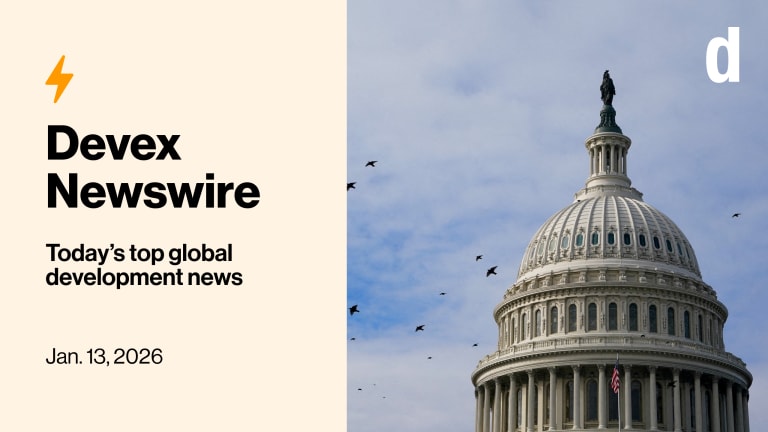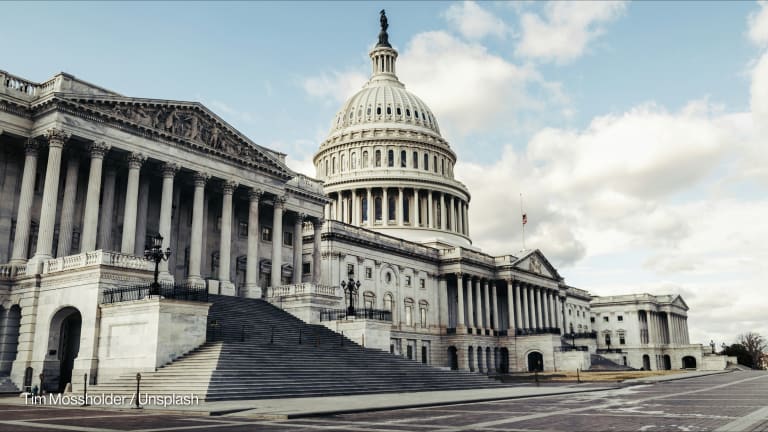
2021 wasn’t exactly a banner year for global development legislation in the U.S. Congress, but 2022 could bring a number of key discussions and budget fights.
A major issue will undoubtedly be the foreign aid budget — both the fiscal year 2022 funding that has been pushed to February and the budget for fiscal 2023. Amid an election year and the potential for a power shift in Congress, advocates say this pair of funding bills will provide the best chance for a boost in foreign aid funding — especially with a significant increase proposed by President Joe Biden’s administration and reflected in draft legislation.
Questions surround topics such as additional COVID-19 global response funding, reauthorizations of major legislation, and new efforts to tackle localization. Advocates are also likely to push for more hearings on Latin America policy, research and development in global health, and the work of the young U.S. International Development Finance Corporation.
“Obviously, there’s a lot one could be cynical about. But I think on these issues it is possible to find consensus and move them forward, and we’ve seen that,” said Bill O’Keefe, the executive vice president for mission, mobilization, and advocacy at Catholic Relief Services.
Devex spoke with global development advocates, Congress watchers, and lobbyists on what to expect.
The money
2022 has two funding bills to watch, since Congress passed temporary legislation delaying decisions for the current fiscal year, which ends Sept. 30.
Lawmakers have until Feb. 18 to pass budget bills or risk a government shutdown, though they could once again pass legislation further delaying a decision. Advocates and experts told Devex they think a deal will be reached by then, unless other priorities delay the broader appropriations process.
Advocates said they hope lawmakers will determine spending limits for two years when finalizing the fiscal 2022 bill, which could allow for a smoother approval process for the fiscal 2023 budget.
One line item to watch in the fiscal 2023 budget will be how much money the administration requests for the Global Fund to Fight AIDS, Tuberculosis and Malaria ahead of its replenishment later this year. The fiscal 2023 foreign affairs budget request is expected to look similar to the fiscal 2022 version, which included $58.5 billion for foreign aid. But one big question is whether the administration will also request supplemental emergency COVID-19 funding that could be included in the fiscal 2022 bill.
In October, administration officials said supplemental funding received through previous funding bills had already been spent. Global health advocates are asking for $17 billion in a supplemental bill for the global COVID-19 response, though some of them say that number is likely too big. A smaller amount of funding may be approved, they said.
One global development lobbyist, who requested anonymity to discuss sensitive topics, said the U.S. Agency for International Development has put together a request for additional funding but it lacks support from the Office of Management and Budget. USAID staffers are asking lobbyists and advocates to “weigh in with the White House” and the State Department, the lobbyist said, to get the administration to make the request.
Congress may well support more funding, but the administration will need to request it, the lobbyist said. “If the administration is not in a position to do that, it doesn’t seem like the prospects are strong,” the lobbyist added.
Republican appropriators have told Kyle Matous, the senior director of U.S. government relations at the ONE Campaign, that they would approve a request for additional COVID-19 funding “because they understand how important it is,” and Democrats have written a letter asking for it, he said.
Localization
A central issue for the administration, and especially USAID Administrator Samantha Power, is a push for more localization. The New Partnerships Initiative Authorization Act — a Senate bill, along with a companion bill in the House that is being developed — could address the issue and may get a look in the year ahead.
Catholic Relief Services has been working with the administration on its policy on local capacity building. But it is important to “embed this critical strategic move in what they are doing,” O’Keefe said. To that end, CRS is trying to find ways to work localization into legislation either through the New Partnerships Initiative bill or through appropriations, he said.
“It’s going to take real work to untangle some of the congressional mandates that limit and USAID regulations that prevent how fast and how far this can go,” O’Keefe said. The “conversation is radically different now” from previous efforts, he said, adding that Congress has much greater understanding about the issue.
While some signs indicate that Congress is interested in legislation on localization, it’s still unclear what form it may take and if it could translate to flexibility in funding and spending directives — a main impediment to greater local leadership — said Erin Collinson, director of policy outreach at the Center for Global Development.
Global health security
For a while, Congress seemed poised to pass global health security legislation in 2021. But despite an effort to get it included as part of the National Defense Authorization Act at the end of the year, it never crossed the finish line.
The State of Global Health Security
What is the state of global health security today, and where does it go from here? Read our special report “The State of Global Health Security” for a look at what we found.
Disagreements revolve around elements of the bill, and both USAID and the Centers for Disease Control and Prevention object to its current form. A sticking point is whether the person leading global health security efforts will be at the State Department or USAID, advocates told Devex. The administration has also yet to state a position on the legislation, but doing so would be helpful, advocates said.
It is unclear whether global pandemic preparedness legislation will regain momentum, according to Collinson.
“There’s a lot of support for elements and a few things people are hung up on,” she said. “It will be a huge disappointment if we don’t use this opportunity to strengthen our global pandemic preparedness.”
If a larger bill on the subject fails to pass, parts of it could be included in other legislation, including an appropriations bill. One element in the global health security legislation that has support in Congress is an authorization for the Coalition for Epidemic Preparedness Innovations, which has passed in the House several times.
Bills to watch
A host of other bills could get picked up and passed this year. Also, discussions will begin for some key pieces of legislation that are up for reauthorization.
The U.S. President's Emergency Plan for AIDS Relief, which is on a five-year reauthorization cycle, will be up for discussion this year, and a bill to reauthorize the HIV/AIDS program will likely be written. If the bill is straightforward — as is expected — it shouldn’t face too many challenges, but any substantive changes proposed by lawmakers could lead it down a trickier path.
The Global Food Security Act is another bill up for reauthorization. CRS will advocate for the addition of a climate change focus to the legislation, adding language about adaptation and more regenerative, nature-based agriculture, O’Keefe said. It will likely pass in 2022, he added.
Discussions about the farm bill, which governs a lot of food aid, will begin this year and are likely to include cutting U.S. cargo preference requirements, as well as increasing the use of flexible cash to address food security challenges.
The Pandemic and All-Hazards Preparedness Act is also up for reauthorization, with negotiations likely to start midway through the year. While it might not be top of mind for some development advocates, it has important global health implications, particularly for research and development.
Other bills to keep an eye on include the Global Malnutrition Prevention and Treatment Act of 2021, a version of which has been introduced in the House and the Senate, as well as the Mental Health in International Development and Humanitarian Settings Act — also known as the MINDS Act — which was adopted by the House Foreign Affairs Committee in December.
Also, the End Tuberculosis Now Act was introduced in December and aims to reassess U.S. support for tuberculosis, including through research and development. And Rep. Joaquin Castro of Texas is working on a bill focused on fostering innovation in global development assistance that is likely to be introduced this year.
DFC
Another legislative issue that Devex has tracked is how Congress views the role of DFC and whether lawmakers will change the way equity investing is scored for budget purposes in the institution.
CEO nominee for US DFC sails through nomination hearing
The Senate Foreign Relations Committee held a nomination hearing for Scott Nathan Wednesday. Here's what was learned about how he'll approach the job if approved.
Last year saw several attempts to make “carve-outs” or exceptions that would push DFC to invest in other geographies or issue areas, mainly from a foreign policy or “geostrategic” motivation, and that could continue, said Conor Savoy, a senior fellow at the Center for Strategic and International Studies.
The pressure to expand DFC’s mandate to work in high-income or upper-middle-income countries “without a development justification” is “problematic,” Collinson said, “and I hope Congress does not submit to that kind of pressure.”
The United States and Congress may want to reconsider the use of other U.S. financing tools as it seeks to compete with China, Savoy said.
If a fix to DFC’s equity scoring moves ahead, it’s likely to come as part of legislation related to competitiveness with China. Several existing bills on the subject have development implications, and it could also be an avenue for some to push for change to DFC’s mandate.








